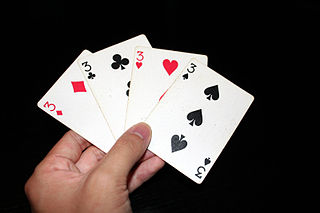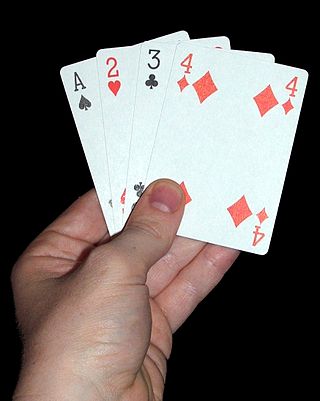
A wild card in card games is one that may be used to represent any other playing card, sometimes with certain restrictions. Jokers are often used as wild cards, but other cards may be designated as wild by the rules or by agreement. In addition to their use in card games played with a standard pack, wild cards may also exist in dedicated deck card games, such as the 'Master' card in Lexicon.
In poker, the nut hand is the strongest possible hand in a given situation. The second-nut hand or third-nut hand may refer to the second and third best possible hands. The term applies mostly to community card poker games where the individual holding the strongest possible hand, with the given board of community cards, is capable of knowing that they have the nut hand.
In a poker game with more than one betting round, an out is any unseen card that, if drawn, will improve a player's hand to one that is likely to win. Knowing the number of outs a player has is an important part of poker strategy. For example, in draw poker, a hand with four diamonds has nine outs to make a flush: there are 13 diamonds in the deck, and four of them have been seen. If a player has two small pairs, and he believes that it will be necessary for him to make a full house to win, then he has four outs: the two remaining cards of each rank that he holds.

Omaha hold 'em is a community card poker game similar to Texas hold 'em, where each player is dealt four cards and must make their best hand using exactly two of them, plus exactly three of the five community cards. The exact origin of the game is unknown, but casino executive Robert Turner first brought Omaha into a casino setting when he introduced the game to Bill Boyd, who offered it as a game at the Las Vegas Golden Nugget Casino. Omaha uses a 52-card French deck. Omaha hold 'em 8-or-better is the "O" game featured in H.O.R.S.E.
Five-card stud is the earliest form of the card game stud poker, originating during the American Civil War, but is less commonly played today than many other more popular poker games. It is still a popular game in parts of the world, especially in Finland where a specific variant of five-card stud called Sökö is played. The word sökö is also used for checking in Finland.
Seven-card stud, also known as Seven-Toed Pete or Down-The-River, is a variant of stud poker. Before the 2000s surge of popularity of Texas hold 'em, seven-card stud was one of the most widely played poker variants in home games across the United States and in casinos in the eastern part of the country. Although seven-card stud is not as common in casinos today, it is still played online. The game is commonly played with two to eight players; however, eight may require special rules for the last cards dealt if no players fold. With experienced players who fold often, playing with nine players is possible.

Texas hold 'em is one of the most popular variants of the card game of poker. Two cards, known as hole cards, are dealt face down to each player, and then five community cards are dealt face up in three stages. The stages consist of a series of three cards, later an additional single card, and a final card. Each player seeks the best five-card poker hand from any combination of the seven cards: the five community cards and their two hole cards. Players have betting options to check, call, raise, or fold. Rounds of betting take place before the flop is dealt and after each subsequent deal. The player who has the best hand and has not folded by the end of all betting rounds wins all of the money bet for the hand, known as the pot. In certain situations, a "split pot" or "tie" can occur when two players have hands of equivalent value. This is also called "chop the pot". Texas hold 'em is also the H game featured in HORSE and HOSE.
In poker, the probability of each type of 5-card hand can be computed by calculating the proportion of hands of that type among all possible hands.

Skat, historically Scat, is a three-player trick-taking card game of the ace–ten family, devised around 1810 in Altenburg in the Duchy of Saxe-Gotha-Altenburg. It is the national game of Germany and, along with Doppelkopf, it is the most popular card game in Germany and Silesia and one of the most popular in the rest of Poland. A variant of 19th-century Skat was once popular in the US. John McLeod considers it one of the best and most interesting card games for three players, and Kelbet described it as "the king of German card games." The German Skat Association assess that it is played by around 25 million Germans – more than play football.
High card by suit and low card by suit refer to assigning relative values to playing cards of equal rank based on their suit. When suit ranking is applied, the most common conventions from lowest to highest are:

Rummy is a group of games related by the feature of matching cards of the same rank or sequence and same suit. The basic goal in any form of rummy is to build melds which can be either sets or runs and either be first to go out or to amass more points than the opposition.

Desmoche is a popular rummy card game usually played for small stakes which closely resembles other games in the rummy family, like Conquian and gin rummy, more than poker. It was probably devised in Nicaragua in the first half of the 20th century.
Open-ended refers to a situation in poker where the player has four of five cards needed for a straight that can be completed at either end. For example, a player with 3♥ 4♥ 5♣ 6♠ is open-ended, because a deuce or a seven would give the player a straight. This situation is also called an outside straight draw or double-ended straight draw as the cards needed to complete the straight are cards which are on the outside of the current hand, as opposed to an inside draw such as 2♦3♠ 4♠6♥ or A♣ 2♣ 3♣ 4♦, which can only be completed by a five. The term originated with draw poker but is also used in games like Texas hold'em.
Pusoy dos, a variation of big two, is a popular type of "shedding" card game that originates on the islands of the Philippines in Calauag, Quezon Province. The object of the game is to be the first to discard one's hand by playing them to the table. If one cannot be first to play all cards, then the aim is to have as few cards as possible. Cards can be played separately or in certain combinations using poker hand rankings. Games of Pusoy Dos can be played by three or four people.

Badugi is a draw poker variant similar to triple draw, with hand-values similar to lowball. The betting structure and overall play of the game is identical to a standard poker game using blinds, but, unlike traditional poker which involves a minimum of five cards, players' hands contain only four cards at any one time. During each of three drawing rounds, players can trade zero to four cards from their hands for new ones from the deck, in an attempt to form the best badugi hand and win the pot. Badugi is often a gambling game, with the object being to win money in the form of pots. The winner of the pot is the person with the best badugi hand at the conclusion of play. Badugi is played in cardrooms around the world, as well as online, in rooms such as PokerStars. Although it hasn’t had its own tournament per se at the WSOP, it is featured in the Dealers Choice events as well as in the Triple Draw Mix. The 2023 WSOP event does have a Badugi tournament scheduled.
Poker hand A is said to dominate poker hand B if poker hand B has three or fewer outs that would improve it enough to win. Informally, domination is sometimes used to refer to any situation where one hand is highly likely to beat another. The term drawing dead is used to denote a domination situation with zero outs.
Baduci is a combination of Badugi poker and deuce to seven triple draw, and uses hand values similar to lowball. The pot in this game is split much like high-low split between the best Badugi hand and the best 2-7 triple draw hand. The betting structure and overall play of the game is nearly identical to a standard poker game using blinds. A players' hand contains five cards, where only four cards are used to determine the best Badugi hand and five cards are used to determine the triple draw hand. During each of three drawing rounds, players can trade zero to five cards from their hands for new ones from the deck.
Draw poker is any poker variant in which each player is dealt a complete hand before the first betting round, and then develops the hand for later rounds by replacing, or "drawing", cards.

Machiavelli is an Italian card game derived from Rummy and is usually played by 2 up to 5 players, but can be played by even a higher number. Because of its characteristics, it is not generally associated with gambling, but is instead a party game.

























